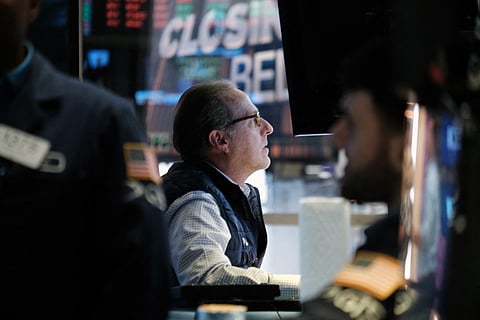
- NEWS
- the EDIT
- COMMENTARY
- BUSINESS
- LIFE
- SHOW
- ACTION
- GLOBAL GOALS
- SNAPS
- DYARYO TIRADA
- MORE

The benchmark Philippine Stock Exchange index is projected to continue its downward trajectory this week as investors await the upcoming policy meetings of the Federal Reserve and the Bangko Sentral ng Pilipinas.
"We may see episodes of bargain hunting as the market lies at attractive levels. However, the general mood is still expected to be bearish as investors price in another possible 75 basis point rate hike by the Fed to combat their still elevated inflation," Japhet Tantiangco, research manager at Philstocks Financials Inc., said.
Stock markets also fell last week as weak UK retail sales data and a dire warning from global shipping giant FedEx fueled fears of recession.
Equities were already struggling this week after data showed US inflation slowed but not as much as expected, adding to fears of aggressive monetary tightening by central banks.
Investors worry that central banks will move too aggressively to tame inflation through rate hikes that could put the brakes on economic growth.
Tantiangco also pointed out that investors are cautiously watching out for the BSP who may also act "aggressively amid the demand side risks to our country's inflation, and the weakening of our local currency which also poses upside risks to the rise of our general price level."
The 75-basis point rate hike by the US Federal Reserve put more depreciation pressure on the Philippine peso and analysts said it may lead to a 50-basis point rate increase by the BSP. Chart wise, the local market's support is seen at 6,400, while its resistance is seen at 6,600. On the last day of the trading day last week, the local bourse sustained its downward momentum and ended the trading day of the week down by 26.9 points or 0.41 percent to 6,548.77 from Thursday's close. The market's total net market value turnover, however, was strong at P14.91 billion.
Wall Street ends low
Wall Street stocks sank lower after FedEx reported on Thursday that it shipped fewer packages than expected over the summer due to weakness in the global economy.
The company said it was closing stores, freezing hiring and parking aircraft, while warning of a big earnings hit, with its CEO Raj Subramaniam telling CNBC he expects a global recession.
"The market is looking weak because of the FedEx warning, but it really goes beyond that," said Briefing.com analyst Patrick O'Hare.
"There are pressing concerns that the aggressive rate hikes by central banks thus far, and the ones that are yet to come, will drive the global economy into a recession that is not 'soft,'" O'Hare said.
The broad-based S&P 500 finished at 3,873.33, down 0.7 percent for the day and nearly five precent for the week.
"These increasing concerns over a global recession, as well as rising US yields are prompting a flight into the US dollar and not much else," CMC Markets analyst Michael Hewson said.
London's FTSE 100 stock index ended the day 0.6 percent lower while the British pound tanked to a 37-year low against the dollar at $1.1351 on news that British retail sales tumbled by far more than forecast in August as shoppers faced rampant inflation.
Sales by volume fell 1.6 percent last month, more than triple what was expected.
Sterling has hit a series of 1985 lows in recent weeks, also as the US Federal Reserve implements aggressive hikes interest rate hikes.
Data made things worse
"Markets are in a lot of pain, and the UK's retail data has made things only worse for traders as it clearly pointed out one thing: an imminent recession," said AvaTrade analyst Naeem Aslam.
"When you look at the sterling against the dollar, it seems like there are no buyers out there."
Elsewhere, Frankfurt equities dropped 1.7 percent and Paris shed 1.3 percent as investors digested confirmation of record-high inflation in the eurozone.
"Data for August confirm that price pressures are very strong and broad-based" with eurozone inflation at 9.1 percent, said Capital Economics analyst Jack Allen-Reynolds.
"The European Central Bank will need to continue hiking interest rates aggressively at forthcoming meetings."
The ECB had last week hiked its key rate by a historic 75 basis points, and markets expect a similar-sized move at the October policy meeting.
The Fed and Bank of England are widely expected to ramp up borrowing costs next week.
The US central bank has lifted borrowing costs by 75 basis points at each of its last two meetings.
